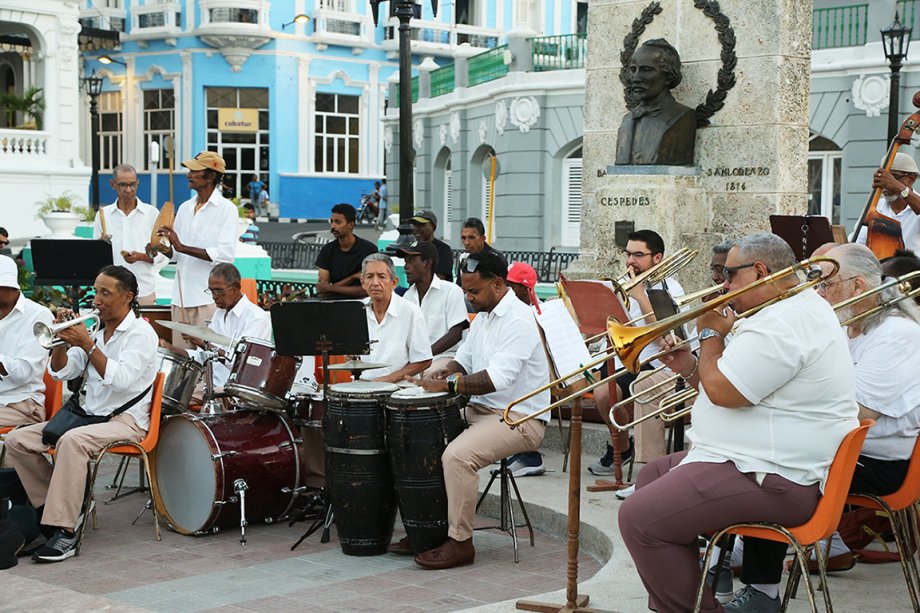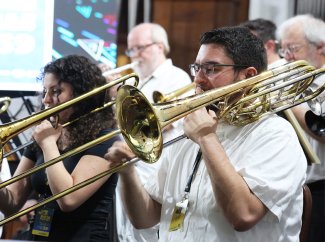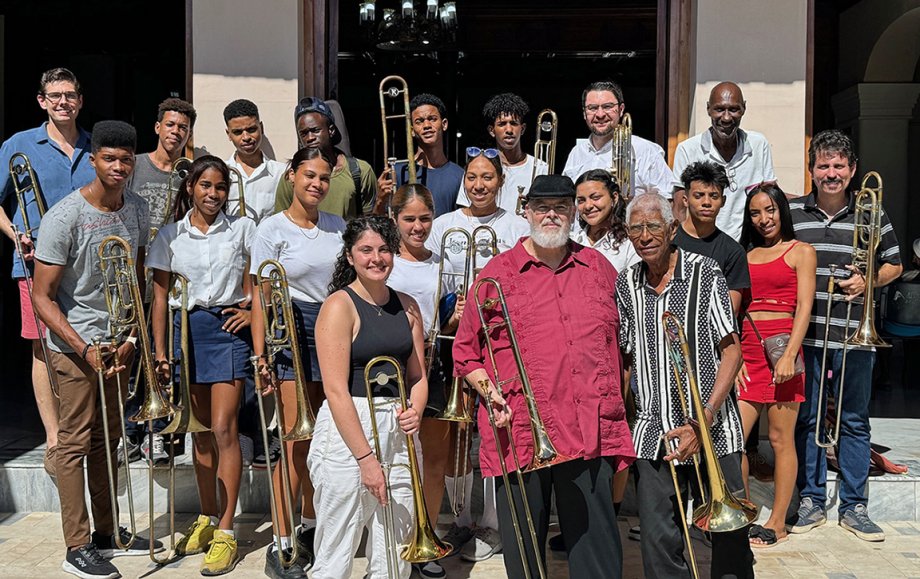
A South Dakota State University faculty member shared his love of the trombone and jazz music earlier this semester in a part of the world that not many people will ever experience firsthand.
For the third time in his music career, the School of Performing Arts’ Bradley Snyder, instructor of low brass, traveled to Cuba to perform for, educate and learn from students, teachers and professional musicians.

From Jan. 21-28, Snyder was in Santiago de Cuba, in southeastern Cuba, as a member of a jazz ensemble that was invited to perform among the featured groups in the Jazz Plaza International Jazz Festival.
While Americans cannot travel to Cuba for tourist activities, travel that falls within 12 areas is covered by a general license from the Department of Treasury’s Office of Foreign Assets Control. Those areas include educational activities; public performances, clinics, workshops, athletic and other competitions and exhibitions; and professional research and professional meetings.
This jazz ensemble trip was coordinated by Michael Davison, professor of music at the University of Richmond, and Mark Lusk, professor of trombone at Pennsylvania State University. The big band included American musicians who are college professors, as well as professional musicians who have performed on Broadway and with other famed artists.
A native of Pittsburgh, Snyder joined the SDSU faculty in fall 2022. He received his doctorate from Florida State University, his master’s degree from Rice University’s Shepherd School of Music and his bachelor’s degree from Pennsylvania State University.
Prior to joining SDSU, Snyder was the bass trombonist with the Ocala Symphony Orchestra for four seasons. He has performed with symphony orchestras and other ensembles throughout the southern U.S. Outside of teaching and performing, Snyder is an active arranger for trombone and low brass ensembles.
This trip was Snyder’s first time performing in the International Jazz Festival. His previous two trips in 2016 and 2017 included performances with a jazz trombone quintet and a 16-piece trombone choir. Snyder’s trips to Cuba started with a connection through his former professor at Penn State.
During the 2024 trip, the jazz ensemble performed three formal concerts. The first was at the legendary Iris Jazz Club, the second at the Sala Dolores Concert Hall, and the last at the home of UNEAC, which translates to the National Union of Writers and Artists of Cuba. Additionally, the ensemble performed an informal concert at the Conservatorio de Musica Estaban Salas.
“While at the conservatory, we were fortunate to engage in instrument-specific master classes with the students and teachers. During our discussion with the students, we talked about a wide range of trombone-specific topics including interpreting American jazz styles, playing in the trombone section of a jazz ensemble, getting started with jazz improvisation, and fundamentals of playing the trombone,” Snyder said.
Snyder said one of the most rewarding aspects of traveling to Cuba is getting the opportunity to spend time with the students, teachers and professional musicians who live there.
“During our trip we were able to sit down with two trombone teachers (one from Santiago de Cuba and the other from the neighboring city of Camaguey), and not only talk about trombone pedagogy, but also about music and what music means not only to them, but to the Cuban people as a whole.”
The trip ended with something that has become a tradition for the American musicians. Members of the trombone section sat in with the local community band that performs in the Parque Cespedes every Saturday at 5 p.m.
“This has always been a favorite thing for members of the group to do because it offers the opportunity for us to reconnect, both musically and personally, with some of the trombone players that we have been able to work with over the last decade. The experience I had in Cuba is one that will continue to inspire my teaching and my musicianship for many years to come,” Snyder said.
Snyder’s musical and educational trip to Cuba is a form of international outreach and falls under faculty’s work in research, scholarship and creative activity.
“It continues to add to the versatility of the styles of music that I perform and am knowledgeable about, that I can share with students. It’s really a life-changing experience to go there because the resources the people of Cuba have at their disposal are so drastically different than what we have at our disposal,” Snyder said.
“But the thing that the Cuban people have that they never lose sight of is their passion for their music and their culture. No matter what’s going on in their life, there’s a love of the music that is special to them. … So much of American jazz is rooted in Cuban music.”

- Contact:
- Telephone number: 605-688-5544
Republishing
You may republish SDSU News Center articles for free, online or in print. Questions? Contact us at sdsu.news@sdstate.edu or 605-688-6161.

